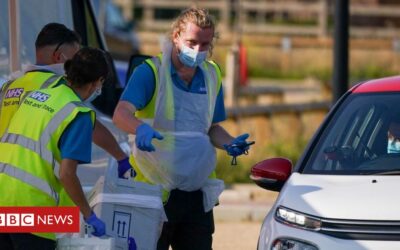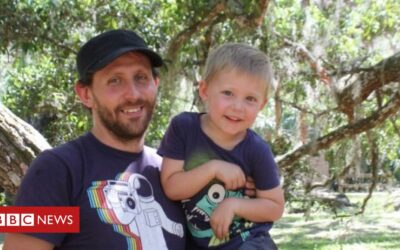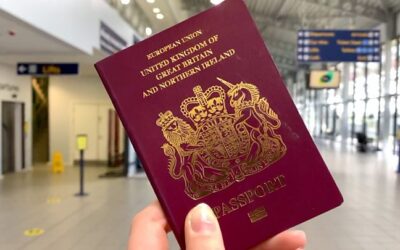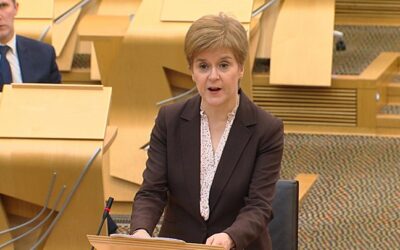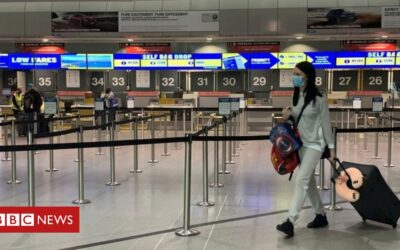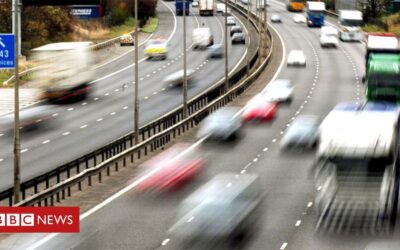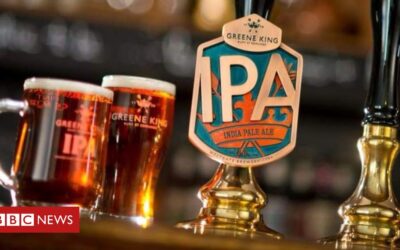“There is increasing concern that the combination of significant job losses over the coming months allied to the scaling back of policy initiatives in early 2021 will have an adverse impact on transaction levels,” warned Simon Rubinsohn, chief economist at The Royal Institution of Chartered Surveyors.
BBC Business News Articles
Government to pay £2m to settle coronavirus testing case
The UK has agreed to settle a lawsuit over how it selected an IT contract for coronavirus testing at its Lighthouse labs.The BBC understands that the settlement will cost the government up to £2m.British company Diagnostics AI claimed it lost out to a European rival UgenTec despite spotting some positive coronavirus cases its rival missed.It sued the government over the decision, claiming the selection process was “unfair and unlawful”.Lighthouse labs are a UK-wide network of specialist coronavirus laboratories managed by the government and run by private firms. When the labs were set up, companies pitched to analyse the test results.The dispute was due to be played out in court. It would have meant a public examination of the accuracy and speed of the testing system, at a time when it has come under serious criticism.But the government has decided to settle the case and will pay Diagnostics AI compensation and most of its legal fees. However, despite agreeing to the payout, the government has refuted the claims made by Diagnostics AI, saying they are “inaccurate”. “The tests are reliable and effective, the laboratories that undertake them have been reviewed and assessed by experts and the percentage of false negatives or positives is tiny,” said a Department of Health and Social Care spokesperson.”This was a commercial dispute over a software contract where a number of factors were considered before it was awarded, which is still subject to final agreement over costs.”As the contract was worth more than £1m, the BBC understands the settlement including legal costs could amount to around £2m.Dispute over contract decisionSwabs are taken from people at testing sites or home tests and treated with a chemical process that produces a graph. The software is used to determine whether the graphs show the sample was positive or negative for coronavirus.Diagnostics AI claimed UgenTec’s analysis of a trial run of 2,000 samples was flawed. In some cases, it claimed UgenTec found negative coronavirus results, when the results were actually positive or inconclusive.”The system that they ultimately went with and decided to pay for missed around 50 out of 800 positive [results], so that’s around one in 15, or so, one in 16 – to be precise – positives,” Diagnostics AI’s chief executive Aron Cohen told the BBC.”Obviously when that translates to hundreds of thousands of samples a day, that’s potentially thousands of missed positives going out every day. So that was really worrying for us.”UgenTec in return claimed that no patients were affected at all as it was a trial run. “We provide crucial covid interpretation services to the Lighthouse Labs to help them manage the vast amounts of data they generate. These claims are inaccurate and misleading,” UgenTec’s chief executive Steven Verhoeven told the BBC. “None of these samples refer to actual results given to patients or the public and to imply any public health impact is wrong. Live tests were not being supported by our software at the time which was in the process of being implemented. As illustrated by independent tests, we have every confidence in our software and the services we provide.”‘A commercial dispute’Two non-profit companies owned and funded by the government were also sued by Diagnostics AI – namely UK Biocentre and Medicines Delivery Catapult (MDC), which ran the process to decide which company to use.Court papers show that between 31 March and 14 April, Diagnostics AI repeatedly requested information about exactly what services were required and how their bid would be evaluated. Diagnostics AI say it never received the information it asked for. This is refuted by UK Biocentre, which says both providers were given the same information.When the two bids were being considered in early April, the UK was facing what Boris Johnson had called a “moment of national emergency”. In such urgent circumstances, the law does make provision for the government to buy services without a competitive process, if certain conditions are met.However, it is understood that both Diagnostics AI and Ugentec had been recommended to UK Biocentre, and so a decision was made to evaluate both offers.Diagnostics AI says this process was unfair and flawed, but UK Biocentre insists it was fair to both bidders.A spokesperson for UK Biocentre said: “The allegations are groundless; this was a commercial dispute. The software in question is being used widely in the Lighthouse Laboratories, in some NHS laboratories and abroad.”External quality assurance has confirmed that the polymerase chain reaction (PCR) testing in the Lighthouse Laboratories, of which the automated diagnostic software forms part, is performing well.”A spokesperson for MDC also provided the BBC with a statement: “The full results of evaluation identified UgenTec as a safe and quality provider, able to deliver in high volumes, and with a comprehensive support system in place. It has performed superbly over the past six months, analysing over eight million test results for the nation. The litigation was purely a commercial dispute.”The BBC understands that investigations were carried out into the claims made by Diagnostics AI, but concluded that concerns over the safety of UgenTec’s software were unsubstantiated.However Mr Cohen disagrees: “The government is paying out a lot of money. And they’re paying this out, you know, to avoid it at least in part, to avoid having to have these issues aired in court, and to have discussions over the accuracy of the testing.”
Coronavirus: Up to £258m self-employment grants 'error or fraud'
HM Revenue and Customs (HMRC) says hundreds of millions of pounds in grants for the self-employed could have been fraudulent or paid in error.In documents seen by BBC Radio 4’s Money Box programme, HMRC says it estimates this to be the case in 1-2% of all cases.With £12.9bn paid out as 4.7m grants, up to £258m could be error or fraud.HMRC says the system was designed to prevent wide-scale fraud and is confident it has done so.The Self-Employment Income Support Scheme (SEISS) is significantly smaller than its counterpart the job retention scheme, which placed millions of people on furlough.SEISS has faced criticism for excluding too many self-employed workers, but with the first grant alone worth up to £7,500, for many the scheme has been a lifeline.But accidental overpayments or fraudulent claims made by criminals using someone else’s name are thought to be two examples of how incorrect payments may have been made.’Complete shock’Andy Charles, a self-employed environmental consultant from Exeter, says he only found out a fraudulent claim had been made in his name when he put a genuine one in.”My initial reaction was just complete shock really,” he told the BBC. “The application process is quite long and includes a lot of personal details, so to come to the end and be told this payment had already been applied for was quite shocking… the mind boggles really.”Up to £3.5bn of furlough payments ‘errors or fraud’
Coronavirus: Claims open for second self-employed support grant
Despite two fraudulent claims being made in his name, Andy was eventually able to get two SEISS grants paid out, which has helped him get through the tough economic times caused by the coronavirus pandemic.However, he still has concerns about how his personal details were used by criminals to make the fraudulent claims.”I’m still, in the background of my mind, a little bit worried about what else people can get into. So can they just get into my personal tax details, is there anything else I’m not aware of?,” he said.”So some real big questions about how the online system works and how HMRC are dealing with this type of stuff at their end.”Fraud preventionHMRC does say the figure is an estimate and should be treated with caution: “We built controls into the application process, including limiting eligibility for the scheme to those who already had a tax footprint with HMRC, to stop fraudulent claims and we’re confident that we’ve prevented large amounts of fraud.”Our post-payment compliance checks to recover money paid out are set to begin, with the focus on those who claimed despite having no active business.”Andrew Chamberlain from the Association of Independent Professionals and the Self-Employed, says the misallocation of government funds is always a serious matter.”Here it’s particularly concerning because this is grant money that could be helping the more than a million struggling self-employed people who are excluded from government support,” he told the BBC. “It’s important to put this in context, however. When compared to the Bounce Back Loan Scheme, where £26bn has been lost from fraud or default, or the Job Retention Scheme, which has lost £3.5bn through default or error, these numbers are comparatively low.”He added that it was “clear” the government needed to address fradulent SESS claims.”Doing so, and plugging the leaks particularly in the BBLS and JRS schemes, would allow it to divert much-needed support to the UK’s forgotten freelancers and self-employed.”You can hear more on BBC Radio 4’s Money Box programme by listening again here.Follow Money Box and Dan on Twitter.
Covid: Taskforce to look at virus testing for UK arrivals
People arriving in the UK from abroad may soon be able to end their 14-day self-isolation early, as part of plans to be considered by a new taskforce.Transport Secretary Grant Shapps said the taskforce will look at introducing a Covid-19 testing system for travellers to the UK.People would have to pay for their own tests to avoid impacting NHS capacity.Airline and airport bosses reiterated calls to replace quarantine altogether, with a comprehensive testing system.The aviation industry has struggled with the drop in passenger numbers since the start of the UK’s epidemic, with industry figures repeatedly lobbying for testing at ports and airports – something ministers have rejected.Anyone arriving to the UK from abroad must currently self-isolate for two weeks, unless they have come from an exempt destination.The plans to be considered by the Global Travel Taskforce include giving travellers the option of paying for a coronavirus test a few days after they arrive.A negative result would mean people could end their quarantine period early.The taskforce will also consider whether people could self-isolate before travelling abroad, instead of upon arrival.If you were running an airline or owned a travel agency I don’t think you’d be jumping for joy. You would probably be relieved that the government has eventually done what you’ve been calling for for months and given a firmer commitment to testing, as a way to allow people to avoid quarantining for the full 14 days.But Heathrow had a facility for taking passengers’ saliva swabs ready to go in mid-August.That facility now appears redundant because the government has rejected the scientific rationale behind testing passengers at airports on arrival – on the basis that asymptomatic people who recently caught the virus could still produce negative results. And even though ministers have made their firmest commitment yet to privately-funded testing, travel bosses will, to some extent, be pulling their hair out that key details still haven’t been worked out. Namely, after how many days of quarantine would someone be able to pay for a test? Between five and eight days is what the government is considering. What airlines really want is the option of people having a test two or three days before they arrive. With a second test after you arrive in the UK that could reduce quarantine even further. The government has crucially indicated that it’s willing to explore that idea. But aviation bosses just want ministers to get on with it – the creation of a taskforce wasn’t the announcement they wanted on Wednesday. Announcing the plans, Mr Shapps said: “The current measures at the border have saved lives. Our understanding of the science now means we can intensify efforts to develop options for a testing regime and help reinvigorate our world-leading travel sector. “This new taskforce will not only help us move towards safer, smoother international travel as we continue to battle this virus but will also support global connectivity – helping facilitate more Covid-secure travel whilst protecting the population from imported cases.”Mr Shapps and Health Secretary Matt Hancock will lead the taskforce to consider:How a testing regime for international arrivals could be implemented, including exactly when passengers would be tested
How to raise consumer confidence to support the recovery of international travel
What “innovate testing models and other non-testing means” could boost travel
The group is expected to report back to No 10 in November. Officials from Scotland, Wales and Northern Ireland will all be involved in the taskforce’s work. But as health matters are devolved, decision making and implementation may differ across the four nations.While industry figures called the announcement a “step in the right direction”, many also reiterated their belief that a testing programme should replace quarantine altogether. A spokeswoman for British Airways added: “Although every step to improve the current situation is welcome, we do not believe quarantine is the solution. The best way to reassure people is to introduce a reliable and affordable test before flying.”Karen Dee, chief executive of the Airport Operators Association – a trade association for UK airports – said: “We believe that from a health perspective a testing regime can be far preferable to just relying on quarantine.”And a Virgin Atlantic spokesperson said: “Removing quarantine is the only way to truly open up the skies and enable the UK’s economic recovery to take off.”
Media playback is unsupported on your device
One airline trade body says testing people before they travel – an idea known as “pre-departure testing” – was becoming the “international norm” and should be adopted in the UK too “as soon as practically possible”.”Aviation is at a critical juncture and we have no time to lose,” added Airlines UK’s chief executive, Tim Alderslade.Many industry figures also called for the taskforce to bring in changes – rather than just recommendations – within weeks.A joint statement from the CEOs of Easyjet, Heathrow, Manchester Airports Group (MAG) and Virgin Atlantic said a testing regime must be in place by early November because without “rapid” action, “the UK will fall even further behind our competitors and the economic recovery will fail to get off the ground”.Almost 900 jobs are at risk at MAG’s three UK airports – Manchester, London Stansted and East Midlands Airport – after the pandemic resulted in the “toughest summer ever”.Shadow transport secretary Jim McMahon said the government had been “incompetently slow to react”.”They’ve had months to set up a taskforce, months to look into airport testing and months to sort out the flaws of their quarantine proposals,” the Labour MP added.He also called for a financial support package for the aviation sector.THE DELIGHTS OF COMMUNAL COOKING: How cooking kept me sane in university lockdown
LOVE LIFE: Fancy an escape? Watch the addictive new series starring Anna Kendrick
Covid: Pubs and restaurants in central Scotland to close
Media playback is unsupported on your device
All pubs and restaurants across central Scotland are to be closed under new measures aimed at tackling a surge in coronavirus cases.The new rules will apply to licensed premises across the central belt, including Glasgow and Edinburgh.Pubs and restaurants will be able to open in other parts of Scotland – but can only serve alcohol outdoors.The new rules, which will be in force from 18:00 on Friday until 25 October, apply to about 3.4 million people.They cover people living in the Greater Glasgow and Clyde, Lanarkshire, Forth Valley, Lothian and Ayrshire and Arran health board areas.First Minister Nicola Sturgeon said the restrictions were “intended to be short, sharp action to arrest a worrying increase in infection”.She warned that without taking action, the country risks “returning to the peak level of infection by the end of the month”.But she admitted that the new rules would be disruptive to many businesses and would be unwelcome to many people.The Scottish Hospitality Group, which includes many of the the country’s best known pubs and restaurants, accused the first minister of “effectively signing a death sentence” for many businesses.And the Federation of Small Businesses said the move would have a major knock on impact across other parts of the economy, including tourism.Opposition parties have called for more detail on a £40m support package for affected business that was announced by Ms Sturgeon, and have questioned the need for the blanket closure of pubs and restaurants.The new rules for the five central belt areas are:all licensed premises – with the exception of hotels for residents – will be required to close indoors and outdoors, although takeaways will be permitted
cafes which do not have an alcohol licence will be able to stay open until 18:00
snooker and pool halls, indoor bowling alleys, casinos and bingo halls will also close in the five health board areas for two weeks from 10 October
contact sports for people aged 18 and over will be suspended for the next two weeks – with an exception for professional sports
indoor group exercise activities will not be allowed, although the current rules will remain in place for under 18s and gyms can remain open for individual exercise
outdoor live events will not be permitted for the next fortnight.
There will be no travel ban in any of the areas, but people in the central belt have been urged to avoid public transport unless it is “absolutely necessary”. And they have also been advised not to travel outside of the health board area they live in if they do not need to.Throughout the pandemic Scotland has tended to adopt a slightly more cautious approach than England.It has imposed more restrictions and lifted them more slowly in general. The latest move is in line with that trend. There is little difference in overall infection rates. Scotland has seen 85 cases per 100,000 in the past week, compared to England’s 109.The measures imposed by the Scottish government are focussed on areas with the highest infection rates.But those places are some way below the levels seen in England’s hotspots.Cities such as Liverpool, Manchester and Newcastle have seen around 500 cases per 100,000 people over the past week – that is more than twice the level of infection in Glasgow for example.But the differences between the two nations should not mask the growing concern there is in England about the infection rates, particularly in the north of country.Senior ministers and their advisers are today discussing whether extra steps are needed south of the border.The problem is action to supress the virus has negative consequences too.This much can be seen in the growing number of scientists and health experts who are signing the Great Barrington Declaration warning about the impact of Covid lockdown policies.In other parts of the country, pubs, bars, restaurants and cafes will be able to open indoors until 18:00 – but only to serve food and non-alcoholic drinks.However, they will be able to serve alcohol in outdoor settings such as beer gardens until 22:00, with the current rules on no more than six people from two households remaining in place.And the existing rules will continue to apply to weddings that have already been booked, and funerals, in all parts of Scotland.Ms Sturgeon said regulations would be introduced to extend the mandatory use of face coverings in indoor communal settings such as staff canteens and workplace corridors.Shops across Scotland will be asked to return to 2m physical distancing from this weekend, and to reintroduce measures such as one-way systems.It comes as Scotland recorded more than 1,000 new confirmed cases of the virus in a single day for the first time – although the country is doing far more testing now than at the height of the pandemic earlier in the year.The R number is currently believed to be higher in Scotland than in other UK nations, and the number of people dying or in hospital with the virus has increased over the past week.The number of UK cases rose by 14,162 on Wednesday. This was a slight drop on Tuesday’s figure, but the seven-day rolling average is still pointing upwards.Speaking in the Scottish Parliament, Ms Sturgeon said the “vast majority” of pubs and restaurants had worked hard to ensure the safety of their staff and customers.But she added: “Indoor environments, where different households from different age groups can mix, inevitably present a risk of transmission. “That risk can be increased in some hospitality premises if good ventilation is difficult, and if it is hard to control the movement of people. “And the presence of alcohol can of course affect people’s willingness to physically distance.” Scottish Conservative group leader Ruth Davidson criticised a lack of detail over the £40m support package that was announced by the first minister.Ms Davidson said: “These businesses deserve better. They need to know how much they can apply for, when they can apply for it and how long they will have to wait before support reaches them. “Those answers could have been provided today, but Nicola Sturgeon failed to do that.” And Scottish Labour leader Richard Leonard said the government should target premises which break the rules “instead of shutting down every single business”.The temporary shutdown of pubs and restaurants across central Scotland with a new 6pm curfew elsewhere are significant new restrictions. Together with the existing Scotland-wide ban on visiting other households, these add up to the toughest combination of measures in place across any of the four UK nations. The Scottish government has decided to take further action because it fears case numbers are rising so fast that without further action, spread would be back to March/April levels by the end of this month. The hospitality industry is not convinced there is sufficient evidence to justify pubs and restaurants being so heavily targeted. The new measures are temporary, partly because the Scottish government has limited scope to compensate businesses. It hopes the UK government can be persuaded to offer additional support for hard hit sectors in the coming weeks and that all four nations can agree a new system for assessing and responding to the coronavirus threat on a more localised basis. Are you a pub or restaurant worker in central Scotland? Share your stories by emailing [email protected] include a contact number if you are willing to speak to a BBC journalist. You can also get in touch in the following ways:WhatsApp: +44 7756 165803
Tweet: @BBC_HaveYourSay
Please read our terms & conditions and privacy policy
If you are reading this page and can’t see the form you will need to visit the mobile version of the BBC website to submit your question or comment or you can email us at [email protected]. Please include your name, age and location with any submission.
Coronavirus: Almost 900 Manchester Airports Group job cuts
Why not follow BBC North West on Facebook, Twitter and Instagram? You can also send story ideas to [email protected]
Extreme poverty set for first rise since 1998, World Bank warns
Extreme poverty is set to rise this year for the first time in more than two decades, with coronavirus expected to push up to 115 million people into that category, the World Bank has said.The pandemic is compounding the forces of conflict and climate change, which were already slowing poverty reduction, the bank said.By 2021, this could rise to as many as 150 million, it added.Extreme poverty is defined as living on less than $1.90 (£1.50) a day.The projected increase would be the first since 1998, when the Asian financial crisis shook the global economy.Global economy ‘will suffer for years to come’Before the pandemic struck, the extreme poverty rate was expected to drop to 7.9% in 2020.But now it is likely to affect between 9.1% and 9.4% of the world’s population this year, according to the bank’s biennial Poverty and Shared Prosperity Report.At the other end of the scale, billionaires have seen their fortunes hit record highs during the pandemic, with top executives from technology and industry earning the most.The world’s richest saw their wealth climb 27.5% to $10.2tn (£7.9tn) from April to July this year, according to a report from Swiss bank UBS.’Serious setback’Since 2013, the World Bank has been working towards the target of having no more than 3% of the world’s population living on just $1.90 a day by 2030.However, it now says that goal will be beyond reach without “swift, significant and substantial policy action”.The World Bank report found that many of the new poor would be in countries that already have high poverty rates, with 82% of the total expected in what are classed as middle-income countries.The bank said progress in reducing global poverty was already slowing even before the Covid-19 crisis. Between 2015 and 2017, 52 million people rose out of poverty, but the rate of reduction over that period was less than half a percentage point a year.This was less rapid than in the years between 1990 and 2015, when global poverty had dropped at the rate of about one percentage point a year.”The pandemic and global recession may cause over 1.4% of the world’s population to fall into extreme poverty,” said World Bank Group president David Malpass. He said that to reverse this “serious setback”, countries would need to prepare for a different economy post-Covid, by allowing capital, labour, skills and innovation to move into new businesses and sectors. However, he pledged that World Bank support would be available to developing countries “as they work toward a sustainable and inclusive recovery”.The Washington-based lender is offering grants and low-interest loans worth $160bn to help more than 100 poorer countries tackle the crisis.
Should your accelerator pedal curb your speeding?
Car makers and safety experts are arguing about the best technology to curb speeding on Europe’s roads.The EU is proposing kit that renders the accelerator pedal temporarily unresponsive when the speed limit is reached. The driver has to push hard on the pedal to de-activate the system and deliberately break the limit. Car makers suggest the cheaper option of a bleeping light on the dashboard.The issue will be debated at a meeting of EU technical experts on Thursday. Whichever system is chosen could apply in the UK, despite Brexit.What’s at stake?Each side says their proposed system will annoy drivers less. The safety experts say their tests show drivers are irritated by the bleep, so they’ll just turn the system off when they arrive at the car.They say the smart throttle doesn’t annoy drivers so much.Dudley Curtis from the European Transport Safety Council (ETSC) told BBC News: “We are concerned that the final outcome of this debate might be a weakened version of the system which has far lower life-saving potential.”The car makers’ association ACEA maintains that it supports safety innovation too. A spokesperson told BBC News it wants a “cascading” system, with a warning light, followed by a beep OR a pedal response. It said: “The system needs to be accepted by drivers as much as possible. To that end, ACEA supports the most flexible approach to driver feedback, with a cascaded warning system – first visual, then acoustic or haptic (touch)”. ‘Huge savings’ETSC says this three-part system will be too slow to alert drivers. It says trials with the beep have just annoyed drivers, especially if they have a passenger onboard.The stakes are high. Huge benefits are envisaged for the planned safety changes – not just a reduction in accidents but also lower emissions from eliminating stop-start driving, and calmer cities for pedestrians and cyclists.Safety experts say the innovations would also present a huge saving to local councils which wouldn’t need to install speed bumps.The safety scheme is proposed to include a host of measures, including:Autonomous emergency braking informed by on-board cameras
Pedestrian and cycle recognition
Drowsiness warnings
Lane departure warnings
The plan would also include lower cabs for trucks, and blind spot warnings for lorry drivers.The standards need to be resolved by April 2021, for car manufacturers to install the technology on any new models from 2022. So, Thursday is a key moment. ‘Massive improvement’ Oliver Carsten from Leeds University trialled the so-called “Intelligent Speed Assistant” accelerator pedal. He told us: “It gave us a massive improvement in speed compliance with UK drivers, especially on urban roads. “We fear that replacing it with a beeping system will just annoy drivers, so they will mute it as soon as they step into the vehicle.”EU Commissioner Elzbieta Bienkowska said: “Every year, 25,000 people lose their lives on our roads. The vast majority of these accidents are caused by human error.”With the new advanced safety features that will become mandatory, we can have the same kind of impact as when safety belts were first introduced.”The new system was agreed in principle when the UK was still in the EU, but the British government won’t commit to adopting the new standards until it can see the shape of its future trade deals. The measures are not being adopted in the USA, although ETSC says it’s been told by American car makers that the technology could be fitted easily.Follow Roger on Twitter @rharrabin
Greene King cuts 800 jobs as pub curfew hits trade
Pub giant Greene King is cutting 800 jobs after deciding that tighter lockdown restrictions mean some pubs will have to close.It said 79 sites will stay closed for the time being, with about one third of these expected to be shut permanently.Coronavirus restrictions, such as the 10pm curfew, and the winding down of the furlough scheme was a “challenge” to trading, Green King said.It urged the government to do more for the struggling hospitality sector.Scotland’s hospitality sector received a jolt on Wednesday when its government said it would close all pubs and restaurants across central Scotland under new measures aimed at tackling a surge in coronavirus cases in the region.The 10pm closing time remains in place in England and Prime Minister Boris Johnson has been challenged to publish the scientific evidence behind that. Labour leader Sir Keir Starmer said the public “deserved to know” the basis for the restriction and if it could not be justified the rule must be reviewed.Tory MPs opposed to the move may rebel in the Commons vote, which is scheduled for next week.An industry body warned on Tuesday that half a million hospitality jobs could go by the end of the year.Pubs and restaurants facing jobs cliff edge
Cities’ economies face decimation under lockdowns
A spokeswoman for Greene King said: “The continued tightening of the trading restrictions for pubs, which may last another six months, along with the changes to government support was always going to make it a challenge to reopen some of our pubs.”Therefore, we have made the difficult decision not to reopen 79 sites, including the 11 Loch Fyne restaurants we announced last week.”Around one-third will be closed permanently and we hope to be able to reopen the others in the future.”She added: “We are working hard with our teams to try and find them a role in another of our pubs wherever possible.”Suffolk-based Greene King, which was bought by a Hong-Kong real estate giant last year, is one of the UK’s biggest hospitality firms, with 3,100 pubs, restaurants and hotels across the UK.The hospitality sector has been struggling with government restrictions designed to slow the spread of coronavirus, including 10pm closing time for pubs, social distancing measures, and mandatory table service for food in licensed premises.Under the government’s furlough scheme, workers put on leave have been able to get 80% of their pay, up to a maximum of £2,500 a month.Industry-wide cutsBut that scheme has been winding down and at the end of October will be replaced by the Job Support Scheme – a less generous wage support scheme. There are fears this will trigger large scale job cuts among businesses struggling to cover their costs.The company said it had a strong track record of redeploying people across its business, and had already identified a number of other opportunities for Loch Fyne employees from the 11 restaurants it said it would be closing last week.Last week, the boss of rival Fuller’s said that about a tenth of its almost-5,000 employees could face redundancy without further state support.The bosses of London-focused groups Young’s and City Pub Group also warned that they might have to get rid of hundreds of roles when furlough ends later this month.Are you a Greene King employee? Share your experiences by emailing [email protected] include a contact number if you are willing to speak to a BBC journalist. You can also get in touch in the following ways:WhatsApp: +44 7756 165803
Tweet: @BBC_HaveYourSay
Please read our terms & conditions and privacy policy
If you are reading this page and can’t see the form you will need to visit the mobile version of the BBC website to submit your question or comment or you can email us at [email protected]. Please include your name, age and location with any submission.
Billionaires see fortunes rise by 27% during the pandemic
Billionaires have seen their fortunes hit record highs during the pandemic, with top executives from technology and industry earning the most. The world’s richest saw their wealth climb 27.5% to $10.2trn (£7.9trn) from April to July this year, according to a report from Swiss bank UBS.That was up from the previous peak of $8.9trn at the end of 2017 and largely due to rising global share prices. UBS said billionaires had done “extremely well” in the Covid crisis.It also said the number of billionaires had hit a new high of 2,189, up from 2,158 in 2017.It comes as a World Bank report on Wednesday showed extreme poverty is set to rise this year for the first time in more than two decades due to the pandemic.Rising demand Among the billionaires, the biggest winners this year have been industrialists, whose wealth rose a staggering 44% in the three months to July. “Industrials benefited disproportionately as markets priced in a significant economic recovery [after lockdowns around the world],” UBS said. China’s new richest person is a bottled water tycoon
Inventor Sir James Dyson tops UK Rich List
Tech billionaires have also had a good pandemic, seeing their wealth soar 41%. UBS said this was “due to the corona-induced demand for their goods and services” and social distancing accelerating “digital businesses [and] compressing several years’ evolution into a few months”.Healthcare billionaires also benefited as the crisis put drug makers and medical device companies in the spotlight.The rise in fortunes reflects the generally strong performance of global stock markets since late March, despite most countries continuing to suffer sharp recessions. Amazon boss Jeff Bezos and Tesla founder Elon Musk – both multi-billionaires – saw their wealth hit new highs this summer thanks to growth in the price of their companies’ stock. Global changeIn the last 11 years China’s billionaires have increased their wealth by the biggest percentage, climbing 1,146% between 2009 and 2020, according to UBS.By comparison, over the same period the wealth of British billionaires has risen by just 168%.But the biggest accumulation of wealth remains in the US where American billionaires have $3.5trn, compared to China’s $1.7trn.The UK’s wealthy have just $205bn, compared to Germany’s $595bn and France’s $443bn.DonationsUBS said many billionaires had donated some of their wealth to help with the fight against Covid-19.”Our research has identified 209 billionaires who have publicly committed a total equivalent to $7.2bn from March to June 2020,” the report said. “They have reacted quickly, in a way that’s akin to disaster relief, providing unrestricted grants to allow grantees to decide how best to use funds.”But it revealed that UK billionaires donated less than those from other countries. In the US, 98 billionaires donated $4.5bn, in China 12 billionaires gave $679m, and in Australia just two billionaires donated $324m. But in the UK, nine billionaires donated just $298m.


